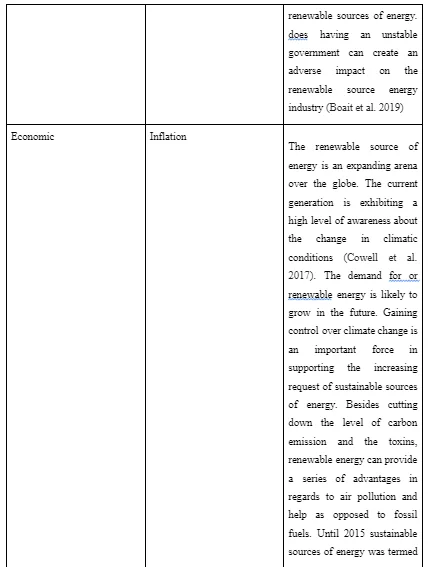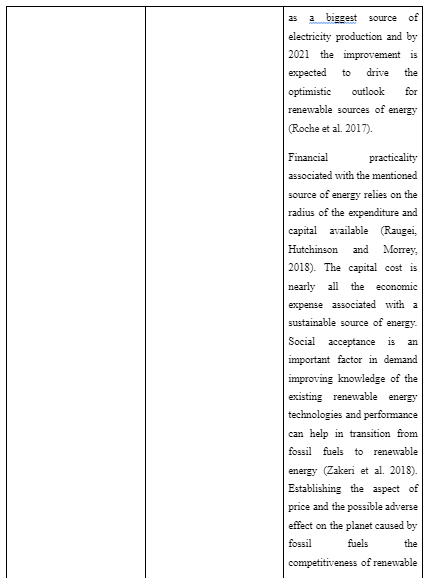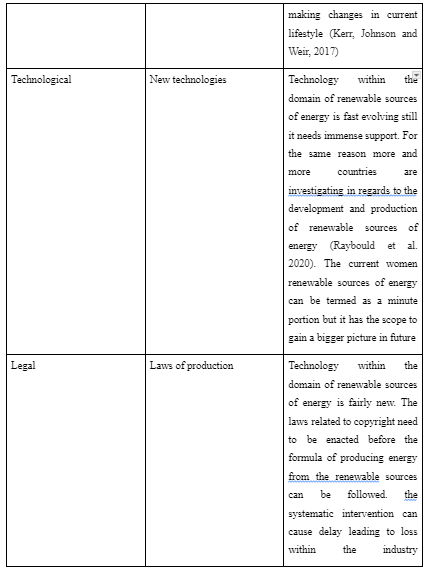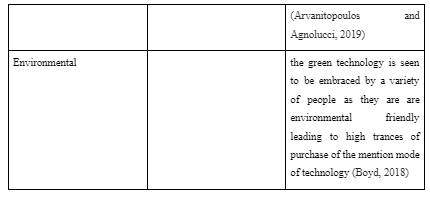Sustainable Energy Dynamics: A Comprehensive PESTLE Analysis for the UK Market
Executive summary
The market in the present setting is bound with challenges and with the persistent interest to pick up benefits it becomes significant that the business consistently update their methodologies. The report hence takes a shot at delivering a PESTLE examination for understanding the difficulties and chances of feasible vitality in the UK. The demonstration of innovative work is moreover restricted because of the significant expenses of innovation related with the equivalent. In this manner, one of the prime difficulties in the referenced situation can be an adjustment in the mindset of the individuals that permits them to surrender the hesitance of surrendering non-renewable energy sources. Additionally, students seeking marketing dissertation help may find similar challenges in adapting to changing market conditions. In any case, with the adjustment in the attitude of individuals and the accessibility of assets, there stay more difficulties that can prevent the improvement of sustainable wellsprings of vitality.
INTRODUCTION
The market in the current context is laced with difficulties and with the continuous demand to gain profits it becomes important that the business continuously update their strategies. The report therefore works on producing a PESTLE analysis for understanding the challenges and opportunities of sustainable energy in the UK.

The PESTLE analysis is termed as an auxiliary tool to clarify the position of a business organization in between the socio-cultural, economic and political scenario, coupled with technological status of sustainable energy in the future. It can help in understanding the prime points to lay out innovative strategies for future
ANALYSIS
PESTLE







CHALLENGES
The challenge in the mentioned case can be termed as lack of adequate funds that could support the research of sustainable sources of energy. However, even before the renewable sources of energy such as wind and air energy could get prominence, nuclear energy came into attention. In addition to that, it would be fair enough to understand the fact that the use of renewable sources of energy is laced with the challenges. The first challenge that can be seen in the chosen industry is the reluctance to change. The social factors such as daily life activities of people using petrol;, diesel and other forms of fossil fuels, it becomes difficult for them to switch to electricity powered cars due to poor services. However, smart businesses such as TESLA aim to leverage the possible opportunity to manufacture electric cars to make entry within the market, enforcing the use of electric cars among the consumers (Whitton et al. 2020). The act of research and development is additionally limited due to the high prices of technology associated with the same. As influenced by Want et al. (2017), fossil fuels have easy ways of extraction and produce a number of alternative products that can be used. For instance, diesel is known to produce by-products for the cosmetic industry. Thus, it can be fair enough to conclude that the industry of non-renewable energy acts as a source of raw materials for many other industries. The fuel plays an important role in events such as transportation. Research based study is seen to make use of renewable sources of energy as it is expected not to give better service than the fossil fuels, for the aviation industry (Gove et al. 2016).
Thus, one of the prime challenges in the mentioned scenario can be a change in the mentality of the people that allows them to give up the reluctance of giving up fossil fuels. However, with the change in the mentality of people and the availability of funds, there remain more challenges that can hinder the development of renewable sources of energy. As stated by Boait et al. (2019), providing power on demand can be termed as a great challenge. As supported by Cowell et al. (2017), renewable sources of energy such as wind and solar energy are highly dependent on weather conditions, which can be highly unpredictable.
The unreliable power grid is one major challenge of after production. The production of energy often demands transmission and there is a loss of energy during the course of transmission. Deciding on the size is an obstacle that makes it difficult for the sustainable sources of energy (Roche et al. 2016). The electricity generated through solar and wind energy cannot be stored, thus to estimate the possible size of the power plant is a big puzzle in itself. Thus, it becomes important to build the right kind of energy firm, so as to ensure that there is no wastage of energy. In order to mitigate the possible risk related to the size of the firm, ASU successfully distributed 90 installations of solar powered panels of different sizes (Zakeri et al. 2018).

CONCLUSION
The current demand of fossil fuels is always on the higher side, given the feasibility associated with the same. However, through the current research report the right way of leveraging the power of fossil fuels can be determined for better outcomes within the energy industry.
Reference
Arvanitopoulos, T. and Agnolucci, P., 2019, August. The Long-Term Effect of Renewable Electricity on UK Employment. In Energy Challenges for the Next Decade, 16th IAEE European Conference, August 25-28, 2019. International Association for Energy Economics.
Boait, P., Snape, J.R., Morris, R., Hamilton, J. and Darby, S., 2019. The Practice and Potential of Renewable Energy Localisation: Results from a UK Field Trial. Sustainability, 11(1), p.215.
Boyd, J., 2018. The progress of renewable energy community initiatives within the Netherlands and the UK, from a strategic niche management perspective.
Cowell, R., Ellis, G., Sherry-Brennan, F., Strachan, P.A. and Toke, D., 2017. Rescaling the governance of renewable energy: Lessons from the UK devolution experience. Journal of Environmental Policy & Planning, 19(5), pp.480-502.
Elgamal, A.H., Kocher-Oberlehner, G., Robu, V. and Andoni, M., 2019. Optimization of a multiple-scale renewable energy-based virtual power plant in the UK. Applied Energy, 256, p.113973.
Gove, B., Williams, L.J., Beresford, A.E., Roddis, P., Campbell, C., Teuten, E., Langston, R.H. and Bradbury, R.B., 2016. Reconciling biodiversity conservation and widespread deployment of renewable energy technologies in the UK. PLoS One, 11(5).
Kerr, S., Johnson, K. and Weir, S., 2017. Understanding community benefit payments from renewable energy development. Energy Policy, 105, pp.202-211.
Mirzania, P., Ford, A., Andrews, D., Ofori, G. and Maidment, G., 2019. The impact of policy changes: The opportunities of Community Renewable Energy projects in the UK and the barriers they face. Energy policy, 129, pp.1282-1296.
Raugei, M., Hutchinson, A. and Morrey, D., 2018. Can electric vehicles significantly reduce our dependence on non-renewable energy? Scenarios of compact vehicles in the UK as a case in point. Journal of Cleaner Production, 201, pp.1043-1051.
Raybould, B., Cheung, W.M., Connor, C. and Butcher, R., 2020. An investigation into UK government policy and legislation to renewable energy and greenhouse gas reduction commitments. Clean Technologies and Environmental Policy, 22(2), pp.371-387.
Roche, R.C., Walker-Springett, K., Robins, P.E., Jones, J., Veneruso, G., Whitton, T.A., Piano, M., Ward, S.L., Duce, C.E., Waggitt, J.J. and Walker-Springett, G.R., 2016. Research priorities for assessing potential impacts of emerging marine renewable energy technologies: Insights from developments in Wales (UK). Renewable Energy, 99, pp.1327-1341.
Shmelev, S.E. and van den Bergh, J.C., 2016. Optimal diversity of renewable energy alternatives under multiple criteria: An application to the UK. Renewable and Sustainable Energy Reviews, 60, pp.679-691.
Tiwary, A., Spasova, S. and Williams, I.D., 2019. A community-scale hybrid energy system integrating biomass for localised solid waste and renewable energy solution: Evaluations in UK and Bulgaria. Renewable energy, 139, pp.960-967.
Walsh, J., Bashir, I., Garrett, J.K., Thies, P.R., Blondel, P. and Johanning, L., 2017. Monitoring the condition of marine renewable energy devices through underwater acoustic emissions: Case study of a wave energy converter in Falmouth Bay, UK. Renewable Energy, 102, pp.205-213.
Want, A., Crawford, R., Kakkonen, J., Kiddie, G., Miller, S., Harris, R.E. and Porter, J.S., 2017. Biodiversity characterisation and hydrodynamic consequences of marine fouling communities on marine renewable energy infrastructure in the Orkney Islands Archipelago, Scotland, UK. Biofouling, 33(7), pp.567-579.
Whitton, T.A., Jackson, S.E., Hiddink, J.G., Scoulding, B., Bowers, D., Powell, B., D'Urban Jackson, T., Gimenez, L. and Davies, A.G., 2020. Vertical migrations of fish schools determine overlap with a mobile tidal stream marine renewable energy device. Journal of Applied Ecology.
Zakeri, B., Price, J., Zeyringer, M., Keppo, I., Mathiesen, B.V. and Syri, S., 2018. The direct interconnection of the UK and Nordic power market–Impact on social welfare and renewable energy integration. Energy, 162, pp.1193-1204.
Take a deeper dive into Strategies for a Century-old Organization in the Uk with our additional resources.
- 24/7 Customer Support
- 100% Customer Satisfaction
- No Privacy Violation
- Quick Services
- Subject Experts



